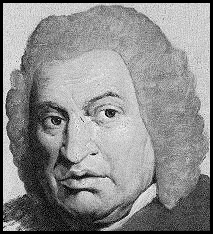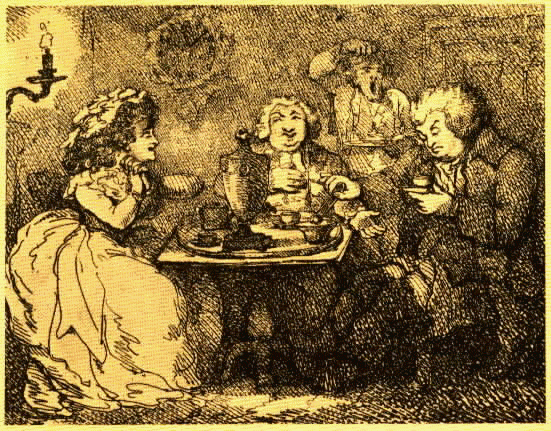Johnson
And the Life of Reading
Robert DeMaria, Jr.
(Johns Hopkins)

- It is requisite to mention that while talking or even musing as he sat in his chair, he commonly held his head to one side towards his right shoulder, and shook it in a tremulous manner, moving his body backwards and forwards, and rubbing his left knee in the same direction, with the palm of his hand. In the intervals of articulating he made various sounds with his mouth, sometimes as if ruminating, or what is called chewing the cud, sometimes giving half a whistle, sometimes making his tongue play backwards from the roof of his mouth, as if clucking like a hen, and sometimes protruding it against his upper gums in front, as if pronouncing quickly under his breath, too, too, too; all this accompanied sometimes with a thoughtful look, but more frequently with a smile.
Generally when he had concluded a period, in the course of a dispute, by which time he was a good deal exhausted by violence and vociferation, he used to blow out his breath like a whale.
Anyone who presumes to study Johnson had best be prepared to study Boswell, too and, most famously, the relationship between the two. Most critics wrongly cite Boswell as a biographer. It is wiser to think of him as the producer of a movie in which Johnson was the main star, Boswell as a co-star, and, possibly, the producer and director --- and make-up man as well.
It was a testy relationship, often they would keep their distance for months or years at a time. The tension between them arose from a build-in sense of competition, and their insatiable desire to hector each other (calling each other "Sir" all the while).
This is their conversation, shortly after Johnson completed his monumental Dictionary of the English Language, which he assembled single-handedly, with its 40,000 definitions and 114,000 quotes, drawn from every field of learning and literature --- a project which cost him nine years of labor, all of which was well known to his interrogator:
-
Boswell:
Johnson: Why, Sir, my Dictionary shows you the accent of words, if you can but remember them.
DeMaria includes here a wonderful aside on Boswell from Johnson's diary: "Having eaten nothing I went to church with Boswel. We came late, I was able to attend the litany with little perturbation. When we came home I began the first to the Thess[alonians] having prayed by the collect for the right use of the Scriptures. I gave Boswel Les Pensées de Pascal that he might not interrupt me."
DeMaria says that Johnson recognized four types of reading: Study, Perusal, Mere Reading and Curious Reading. The first is "hard reading," a work of "privilege," like reading the Bible or, in Johnson's case, the New Testament, in Greek. (Johnson, could, according to the author, read Greek haltingly, but had no problem with Latin.)
Perusal is more for pleasure, even though it might include a moral handbook, the "vade mecum."
- I call this purposeful, attentive, yet relative easy reading, "perusal,"
says DeMaria.
As for "Mere Reading," he says it might be "a downward shift," where "reading became a matter of mere reading and less often a matter of study..." such as you and I, in the morning, with our Cheerios, over breakfast, and a newspaper.
Finally, "the typical material of curious, inquisitive, and addictive reading is romance and other kinds of fiction;" what John Adams called "incredible delight;" what Thomas Jefferson cursed as a passion "that infects the mind,"
- The result is a bloated imagination, sickly judgment, and disgust towards the real business of life.
All this is sheer nonsense, of course. Even though DeMaria is a learned man who has devoted many years, perhaps too many, to Samuel Johnson (has written a few books on him, too) ... his attempt to hang a whole system like reading on something as intangible as our state of concentration or diligence as we are gong along is silly, if not downright daffy; reminds us of the even more daffy History of Reading by Alberto Manguel. In an early edition of this magazine, our reviewer said that Manguel was a man who couldn't
- write a simple declarative sentence without dropping the name of Richard de Fournival (Chancellor of the Cathedral of Amines, 1250), or Henry Walton Smith (Bookseller, London, 1792), or Apollonius (Finance Minister of Alexandria, 258 BC).
DeMaria is not a polymath show-off as Manguel, but his four stages of reading are still stuff and nonsense. Furthermore, if you are going to do a study of Samuel Johnson, forget the sophists: go directly to the source, Boswell. Furthermore --- get your facts right.
There is, for example, a page or so on Johnson's handling of books, which David Garrick found to be "rude." Garrick loaned him his Petrarca, but when Johnson opened the "stupendously bound" copy, he --- according to Boswell, the in-house rat --- "poured forth a Greek ejaculation and a couple or two from Horace"
- and then in one of those fits of enthusiasm which always seem to require that he should spread his arms aloft in the air, he suddenly pounces my poor Petrarca over his head upon the floor!
"And then, standing for several moments but in abstraction, he forgot, probably that he had ever seen it." DeMaria then interjects, "Garrick's story sounds too entertaining to be true," which shows that he hasn't done his homework.
